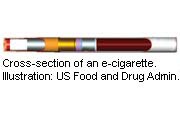
THURSDAY, Sept. 9 (HealthDay News) — The U.S. Food and Drug Administration cracked down Thursday on five distributors of electronic cigarettes, citing them for a series of violations that included unsubstantiated claims and poor manufacturing practices.
The agency said that e-cigarette distributors falsely claim that e-cigarettes — battery-operated devices that contain cartridges filled with nicotine, flavorings and other chemicals — will help people quit smoking.
“The device turns nicotine, which is highly addictive, into a vapor that is inhaled,” according to the FDA.
“These products are not proven safe and effective yet,” Michael Levy, director of the division of new drugs and labeling compliance in the FDA’s Center for Drug Evaluation and Research, said at an afternoon press conference.
The FDA said in July that its tests had shown that some e-cigarettes contain cancer-causing chemicals and other toxins, including a compound used in antifreeze.
In addition, at least one electronic cigarette company cited was selling unapproved weight loss and erectile dysfunction drugs designed to refill e-cigarette cartridges, the agency said.
For people addicted to cigarettes, “there are FDA-approved smoking cessation aids on the market,” Levy said.
The companies receiving warning letters are E-CigaretteDirect LLC, Ruyan America Inc., Gamucci America (Smokey Bayou Inc.), E-Cig Technology Inc. and Johnson’s Creek Enterprises LLC.
Although these companies claimed their products help people quit smoking cigarettes, these claims have not been evaluated by the FDA, the agency said.
The FDA also cited E-Cig Technology for marketing tadalafil, an erectile dysfunction drug, and rimonabant, a weight loss drug that has not been approved for use in the United States, for use in e-cigarettes. These liquid drugs are made as refill cartridges for use in e-cigarettes so they can be vaporized and inhaled, the agency said.
In addition, the agency cited Johnson Creek Enterprises, which markets Smoke Juice, a liquid solution used to refill cartridges in e-cigarettes, for deficiencies in its manufacturing processes. These included a failure to establish quality control and testing required by law, the agency said.
At the press conference, Levy said the agency is interested in finding out if e-cigarettes can be safe and effective.
To that end, the FDA sent a letter to the Electronic Cigarette Association, saying that the agency will regulate electronic cigarette and related products as part of its mission to protect the public health.
“FDA invites electronic cigarette firms to work in cooperation with the agency toward the goal of assuring that electronic cigarettes sold in the United States are lawfully marketed,” the agency wrote to the association.
Under the law, a company cannot say its drug can treat or mitigate a disease, such as nicotine addiction, unless it has proved to the FDA that the drug is safe and effective for its intended use.
The battle over whether e-cigarettes are legal has been heating up over the past year. The FDA contends that e-cigarettes are both a drug and a device, making them subject to U.S. government regulation under the Federal Food, Drug and Cosmetic Act.
But, one of the companies that markets e-cigarettes, Smoking Everywhere, filed suit against the FDA in April. It claimed that the agency overstepped its authority by banning shipments and insisting that e-cigarettes go through the drug approval process, FDA officials said in April.
Levy declined to comment on the status of the pending suit.
More information
For more information on electronic cigarettes, visit the U.S. Food and Drug Administration.

